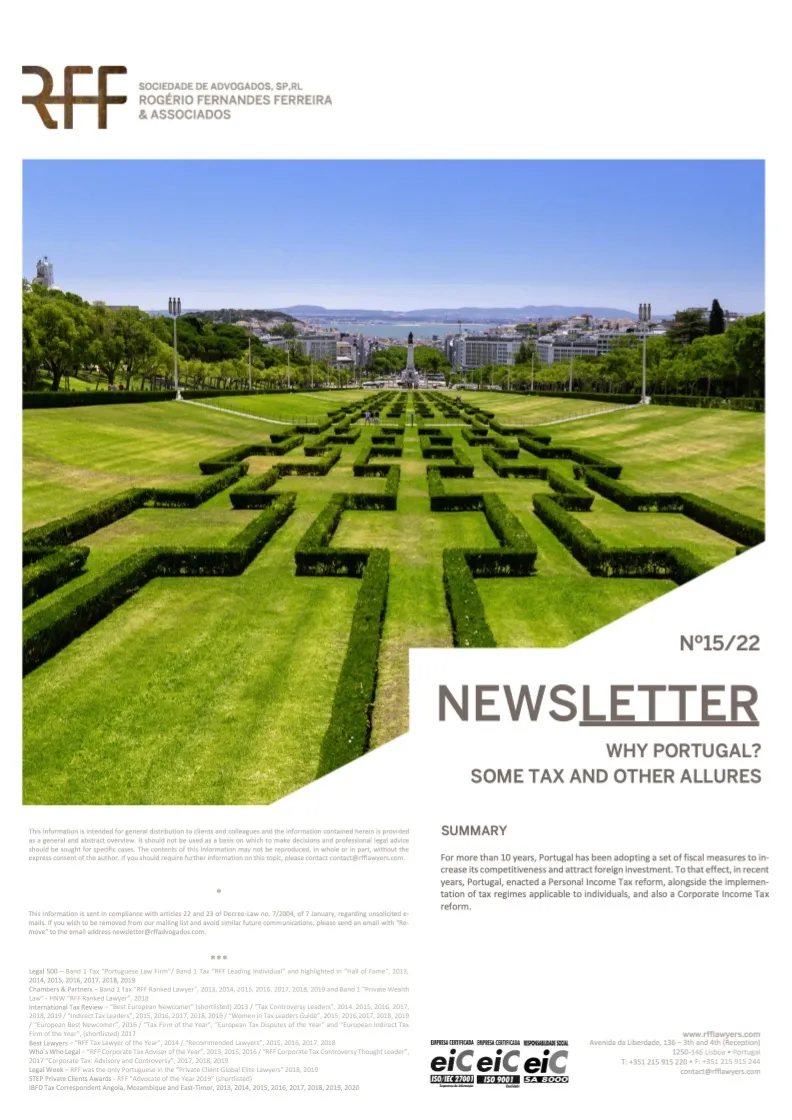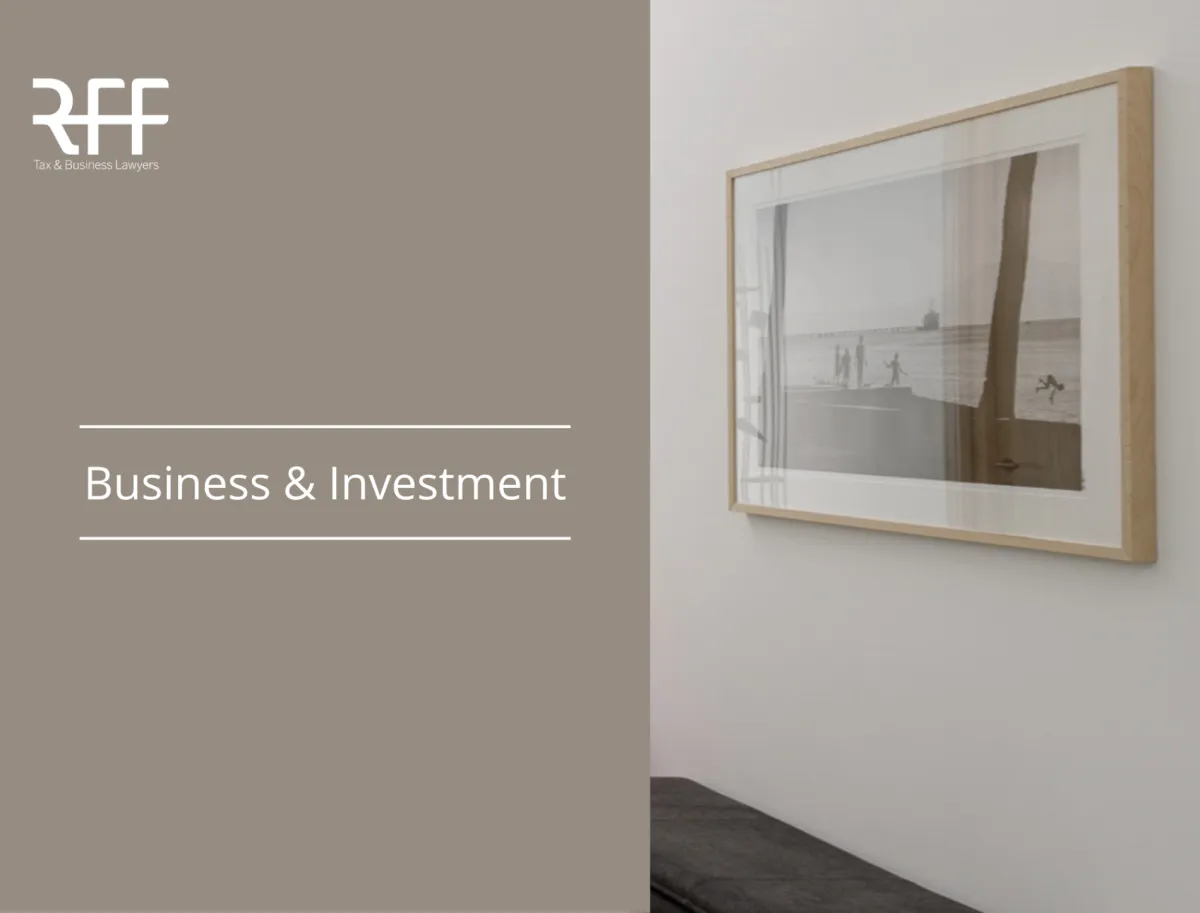Why Portugal? Some Tax and other allures

Why Portugal? Some Tax and other allures
SUMMARY
For more than 10 years, Portugal has been adopting a set of fiscal measures to increase its competitiveness and attract foreign investment. To that effect, in recent years, Portugal, enacted a Personal Income Tax reform, alongside the implementation of tax regimes applicable to individuals, and also a Corporate Income Tax reform.
INTRODUCTION
For more than 10 years, Portugal has been adopting a set of fiscal measures to increase its competitiveness and attract foreign investment.
To that effect, in recent years, Portugal, enacted a Personal Income Tax reform, alongside the implementation of tax regimes applicable to individuals, and also a Corporate Income Tax reform.
Furthermore, from the perspective of many foreign countries, Portugal is seen as the main liaison jurisdiction, not only with Europe - allowing the use of various community regimes that Portugal, as a Member State of the European Union (EU), benefits from -, but also with its former colonies, namely Brazil and the group of countries designated as African Portuguese Speaking Countries (PALOP), such as Angola, Guinea-Bissau, Cape Verde, São Tomé and Príncipe, Mozambique, and Equatorial Guinea. In fact, the historical ties that unite Portugal to these countries allowed the setting forth of several agreements that enable and encourage the circulation of individuals and goods between these jurisdictions.
In addition, Portugal benefits from an extensive network of Double Tax Treaties (DTT), including, with Macau which can provide a gateway to China.
There is also the Portuguese coastline, which grants a special geographical advantage – enhanced by deep-water harbours, such as the Sines harbour, and by the opportunities brought by the opening of the Panama and Suez canals – this seems to be the time for foreign investors to take advantage of the future opportunities in Portugal as a host country with a prominent position on the international tax panorama – therefore, as a natural investment platform – has to offer today.
Taking all the above into consideration, we take this opportunity to summarize some of the main opportunities and other allures that make Portugal so attractive.
1. THE GOLDEN VISA PROGRAM
Under this regime, citizens of non-EU states who perform or carry out one of the investments legally foreseen – such as the transfer of capital in the amount of at least € 1,500,000.00 or the acquisition of real estate with a minimum value of € 500,000.00 or € 350,000.00 with refurbishments (among several others).
2. THE NON-HABITUAL RESIDENTS REGIME
In practical terms, this regime encloses undeniable advantages related to income taxation, such as the fact that the employment income and self-employment income rendering of high value added activities, with scientific, artistic, or technical nature are subject to PIT at a flat 20% tax when compared to the maximum possible effective taxation of 53%, and most of the income earned abroad by NHRs will be exempt in Portugal, as long certain conditions are verified.
3. PORTUGAL DOES NOT LEVY TAX OVER THE GRATUITOUS TRANSFER OF ASSETS
Moreover, Portugal does not levy tax over the gratuitous transfer of assets (gifts or donations), during life or upon death (mortis causa), when the beneficiaries are the spouses, common law spouses and descendants or ascendants in a direct line of the owner, unlike France for example, there are no wealth taxes.
4. PORTUGAL PARTICIPATION EXEMPTION REGIME
The Participation Exemption regime fore-sees tax advantages for companies which are tax resident in Portugal, such as the exclusion, for the purposes of determining their taxable profit, of the profits and reserves distributed to these companies, or the exemption of capital gains from the onerous sale of shareholdings held by the taxable subjects, upon verification of certain legally provided conditions.
Non-resident entities also benefit from a tax exemption on the profits and reserves distributed to them, provided that they are residents in the EU, in the European Economic Area (EEA) or in a State with which Portugal signed a DTT.
5. THE POSSIBILITY FOR BUSINESS INVESTMENT OF DEDUCTING AND REPORTING TAX LOSSES
The tax losses registered in a given tax period may be carried forward and deducted to tax profits for a period of 5 years (limited to 70% of the taxable income determined that same year). It should be noted, however, that companies recognize as Small and Medium Enterprises (SMEs) benefit from an extension of the reporting period, being able to deduct tax losses for 12 tax years.
6. “PATENT BOXES” REGIME
This regime is applicable to assignment contracts or temporary use of some industrial property rights and constitutes an incentive for businesses to invest in Portugal. Under this regime, the income derived by the mentioned contracts is taxed at only half of their value, provided certain conditions are met.
7. THE PORTUGUESE TAX NEUTRALITY REGIME
The Portuguese tax neutrality regime, with the provisions of the EU Merger Directive, applies to different corporate restructuring operations, foreseeing a tax exemption of capital gains arising from these corporate restructuring operations, provided certain conditions are met.
8. THE MADEIRA FREE TRADE ZONE AND THE INTERNATIONAL BUSINESS CENTER OF MADEIRA
The Madeira Free Trade Zone and the International Business Center of Madeira comprise, on one hand, a special tax regime, of regional scope, authorized by the European Commission, which offers companies therein, incorporated before December 2020, and which create jobs, ample tax benefits such as the application of a reduced CIT rate of 5% until December 2027.
It should also be noted that on 22 December 2020, the Portuguese Government approved a proposal to extend for 1 more year the deadline for issuing licenses to operate at Madeira Free Trade Zone. Besides the reduced general rate of 5% applicable until 2027, the industrial companies established in the Industrial Free Zone may also benefit from a 50% reduction on taxable profit, provided certain requirements are met.
9. EXIT TAXATION IS STRICTLY LINKED TO THE GROWING PHENOMENON OF CIRCULATION AND ESTABLISHMENT OF INDIVIDUALS AND COMPANIES WITHIN THE EU
The European Court of Justice (ECJ) had already addressed this topic, in particular, regarding the Portuguese exit taxation regime (case C-38/10), which provided that when a Portuguese company opted to change tax residency, it would be taxed regardless of the fact that it had not actually obtained any gain or surplus-value, and the Court considered that this regime constituted an obstacle to the freedom of establishment.
10.LEGAL REGIME OF TAX ARBITRATION
Arbitration has several advantages in comparison to the judicial process. It allows the resolution of disputes in a simpler way since the processing is simplified and the process is dematerialized, electronic and faster. In fact, as a rule, the final decision is issued within a maximum period of 6 months (on average 4.5 months).
11. NETWORK OF DOUBLE TAX TREATIES (DTT)
Portugal signed DTT with 79 countries, including all Portuguese-speaking countries, 12 American countries, 17 Asian countries and almost all European countries.
In the absence of a DTT, Portugal still unilaterally offers a reduction or even the elimination of international double taxation to resident taxpayers.
Lisbon, March 29th 2022
Rogério M. Fernandes Ferreira
Duarte Ornelas Monteiro
Joana Marques Alves
Ricardo Miguel Martins
Vanessa Lopes Rodrigues
Teresa Salgueiro Verdasca
Marta Cabugueira Leal
João Rebelo Maltez
(Private Clients Team)
